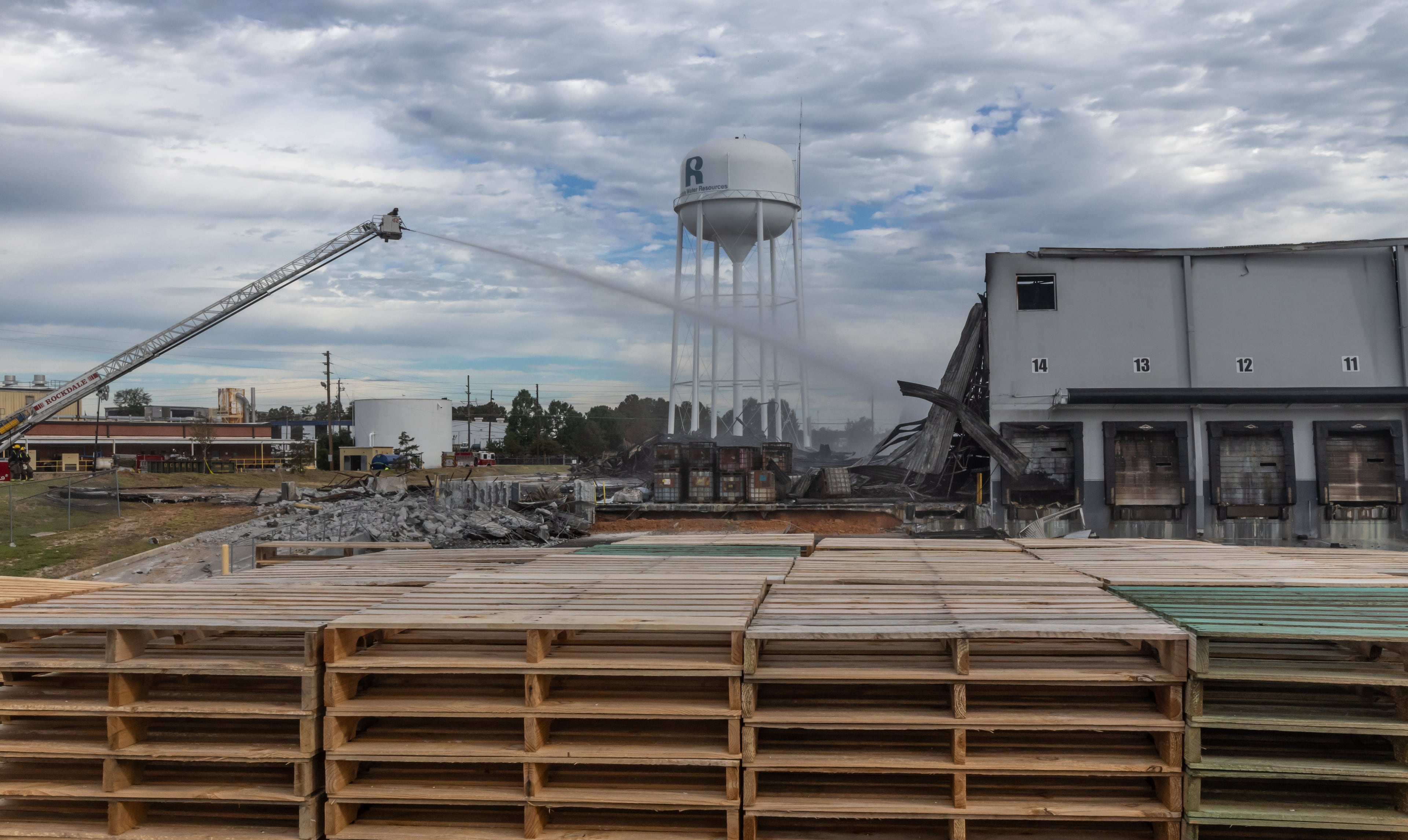BioLab fire: Warehouse stored 14M pounds of chemicals, feds say
Editor’s note: This story has been updated with comment from BioLab.
At the time of the massive September fires that blanketed parts of metro Atlanta in toxic plumes, BioLab was storing more than twice the amount of reactive chemicals in its warehouse than it had previously disclosed to Rockdale County officials years before, according to a new report from the U.S. Chemical Safety and Hazard Investigation Board.
In 2019, when BioLab requested permits to build a new warehouse at its Conyers facility, the company told Rockdale officials it anticipated an “average inventory” of about 6.2 million pounds of raw materials would be stored there, the federal agency also called CSB said.
But at the time of the fires, nearly 14 million pounds of chemicals were stored in the building, according to the CSB report. The permit, however, did not have a numeric limit on the quantity of raw materials stored in the building, according to the report, which cited comments from BioLab.
Last September, raw materials at the pool chemical maker in Conyers ignited, sending massive amounts of smoke billowing into the air, causing parts of I-20 to shut down, the evacuation of 17,000 residents and shelter-in-place orders for about 90,000 people. The orders would go on for weeks.
“The more we learn about this unacceptable incident, the more disturbing it is,” CSB chairperson Steve Owens said in a news release. “This is a stark reminder of the very serious dangers that can occur when enormous amounts of reactive and corrosive chemicals are stored without proper safeguards in place.”
In a statement Tuesday night, a company spokesperson said, “BioLab has a strong track record of working constructively with regulatory agencies and will continue to cooperate with the CSB’s ongoing investigation, although we disagree with many of CSB’s statements.”
“The health and safety of the communities within which we operate is a top priority, and we worked collaboratively with first responders and local, state, and federal authorities to complete the emergency response operation in October 2024. The clean-up of the site affected by the fire has also been successfully completed,” the spokesperson said.
In the warehouse where the fires ignited, BioLab stored multiple types of oxidizers, which is “any material that readily yields oxygen or other oxidizing gas or that readily reacts to promote or initiate combustion of combustible materials,” according to the CSB report. Under some circumstances, oxidizers can “undergo a vigorous self-sustained decomposition due to contamination or heat exposure.”
In the early morning hours of Sept. 29, some of those chemicals came into contact with water, causing a reaction that generated heat. It led to the decomposition of the materials, and that subsequently caused the fires in the building, according to the CSB.
Rockdale County firefighters who responded to the scene told the CSB they saw chemical reactions “in the form of ‘small explosions’ with product physically shooting out from the building, as well as hearing ‘popping’ sounds,” investigators wrote.
The firefighters had to relocate one of their engines “because it was ‘getting pummeled’ by the reacting product and that ‘it sounded like you were at the gun range with pow, pow, pow, pow, pow,’” they continued.
The source of the water that set off these reactions has still not been determined, and the CSB’s investigation is ongoing.

Earlier this year, BioLab was fined more than $61,000 by the federal Occupational Safety and Health Administration for violations stemming from the September incident.
Prior to the fire, BioLab, which has operated in Rockdale since 1973, was one of the county’s largest employers. But an AJC review of state and federal records last year found September’s incident was at least the fourth major fire or chemical leak at a BioLab facility in the past 20 years.
In the wake of the fire, citizen groups called for the factory to be closed permanently. BioLab announced earlier this month it would not restart manufacturing at the factory, but said its nearby distribution center would continue to operate.
— Senior editor J. Scott Trubey and staff writer Drew Kann contributed to this report.
The Atlanta Journal-Constitution and Report for America are partnering to add more journalists to cover topics important to our community. Please help us fund this important work here.


